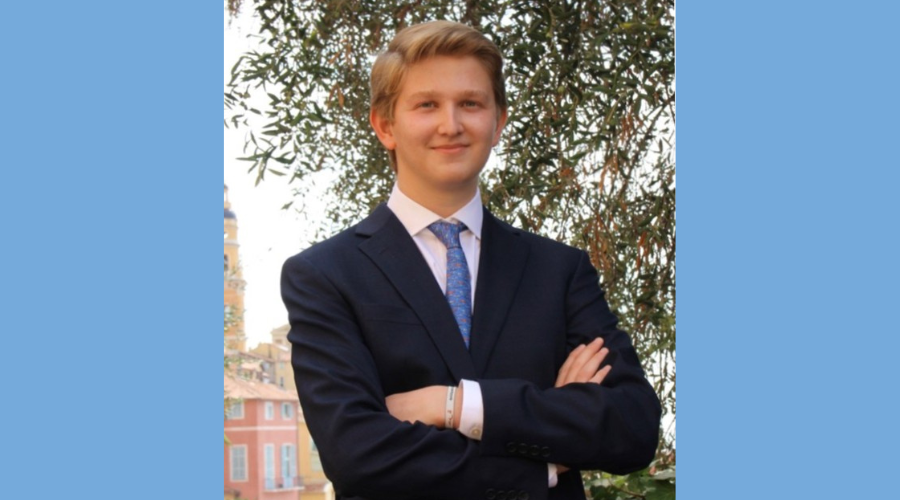Third-Year Student Presents at the 2023 Columbia Undergraduate Research Symposium
Sami Omaish shares his undergraduate research experience, including how it empowered him to engage with his Syrian and Jordanian heritage.

Every year, students from Columbia’s undergraduate schools showcase their research at the esteemed Columbia Undergraduate Research Symposium. In this year’s event, Sami Omaish '25GS, an urban studies major, was among over a dozen GS students featured at the event. Omaish shares the story behind his project, “A Way of Walking: Conversations with Michael Gilsenan,” discussing the academic opportunities it has unlocked and its resonance with his continuous pursuit to reconnect with his Syrian and Jordanian heritage.
Tell us about your research: the what, why, and how.
I worked on a faculty-sponsored project through the Undergraduate Research Fellowship (URF). Specifically, this was a “Digital Humanities” project led by Dr. Lila Abu-Lughod from the Department of Anthropology compiling the life and work of one of her colleagues and friends, Dr. Michael Gilsenan, former professor of anthropology and Islamic studies at NYU. While I didn’t have much background in anthropology before completing this project, I had just completed two years specializing in the Middle East at the Menton campus of Sciences Po.
Furthermore, my dad’s family comes from Jordan and Syria, and since I spent most of my childhood in the US, I have been working to reconnect with this part of my heritage. Thus, it was the focus on the Middle East that drew me to this project — Dr. Gilsenan completed field work in Yemen, Egypt, and Lebanon, as well as with the Yemeni diaspora in Singapore and Malaysia. Additionally, Dr. Abu-Lughod herself completed fieldwork in Egypt and is a leading scholar on women’s rights and Islam.
Regarding the project itself, I worked with a research partner to transcribe and edit a series of interviews Dr. Gilsenan completed with various other scholars, primarily those specializing in Middle East and Islamic studies, about a variety of topics. Some interviews focused on his field work, others on his personal life. In the end, these interviews and their transcriptions will be published on a website that aims to serve as a “Festpod” — taking from the German word “Festschrift,” meaning a celebratory piece of writing, to in this case denote a celebratory “podcast” of Dr. Gilsenan’s long and accomplished academic career.
"All I can suggest is that if you’re interested in research, just go for it, regardless of your experience or background. Whether that means applying through the URF platform or emailing a professor, the worst answer you can get is a 'no.'”
Why did you want to pursue a research opportunity, and how has it enriched your undergraduate experience?
At the moment, I am not planning to work in academia after graduation, so this research experience was primarily aimed at deepening my current academic study rather than preparing for a future career. First of all, the opportunity to work with leading scholars in the fields that most interest me was an incredible experience in and of itself and furthered my interest in the Middle East. Furthermore, as the focus of our work was primarily anthropological, it offered a refreshing new perspective from the politics-focused study I did at Sciences Po.
It gave me the chance to learn more about individual lived experiences — not just Dr. Gilsenan’s, but also those of the many locals he met during his years working in the field. I am so thankful to have been exposed to the work of both Dr. Gilsenan and Dr. Abu-Lughod, as much of their work — some of which I learned about from the research, others from reading their published books — has allowed me to see this region that I feel such a deep connection to through different angles and perspectives.
What advice would you give to other students interested in research experiences?
I participated in the URF program before even starting at Columbia, and I will admit that I was quite nervous. It ended up being an amazing experience, allowing me to explore Columbia and its incredible resources ahead of time and make the most of the 2 years I will spend here. Thus, all I can suggest is that if you’re interested in research, just go for it, regardless of your experience or background. Whether that means applying through the URF platform or emailing a professor, the worst answer you can get is a “no.” I didn’t even have formal research experience before starting, so this was the perfect way to begin. It has already opened the door to more opportunities with my former research advisors — over winter break, I’ll be helping Dr. Gilsenan with the latest book he’s writing!
